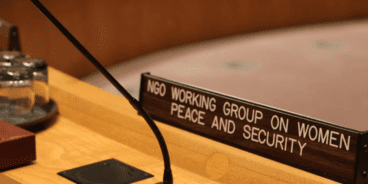
Civil Society urges UN Security Council to uphold its Responsibility in Mass Atrocity Situations
On 30 September 2015 the governments of France and Mexico hosted a Ministerial Side-event on “Restraining the Use of Veto in Face of Mass Atrocities.” To coincide with the meeting, a joint NGO statement was released.
Amnesty International, Global Centre for the Responsibility to Protect, Human Rights Watch, International Federation for Human Rights and World Federalist Movement acknowledge the seventieth anniversary of the United Nations and the efforts undertaken by UN peacekeepers and humanitarian workers over the past seven decades. The United Nations was founded in the aftermath of the Holocaust and a devastating World War to “save succeeding generations from the scourge of war.” However, not since 1945 have so many people been displaced by armed conflict and mass atrocities. The UN’s relevance and success in our century will be measured in its ability to meaningfully uphold its responsibility to protect those facing genocide, war crimes and crimes against humanity.
At a time of crisis, the UN Security Council often appears paralyzed. On four occasions since October 2011 the veto has been exercised by two of the Security Council’s permanent members, Russia and China, to protect the government of the Syrian Arab Republic from resolutions meant to address crimes against humanity and war crimes committed against the Syrian people. That conflict is now over four years old and has consumed over 220,000 lives. Urgent measures have still not been taken to protect civilians from mass atrocities and to confront the perpetrators, regardless of position or affiliation.
Those vetoes undermined the legitimacy of the Security Council, shielded perpetrators from accountability and cost lives.
We believe that the Security Council’s failure to take effective action on the crisis in Syria is a betrayal of the pledge made by the international community in the World Summit Outcome Document – a commitment reaffirmed by the Security Council itself – to take collective action, in a timely and decisive manner, through the Security Council, to protect populations whose own states manifestly fail to protect them from genocide, war crimes, ethnic cleansing and crimes against humanity.
Russia and China are not alone. All Permanent Members of the Security Council have, at one time or another, misused and abused their veto prerogative. But defending those committing mass atrocity crimes can never be justified as a matter of “vital national interest.” Such an approach is always contrary to the purposes and principles of the UN.
This is the context in which we welcome the leadership of France and Mexico in calling upon the Permanent Members of the Security Council to agree on voluntary veto restraint in mass atrocity situations. Genocide, war crimes and crimes against humanity are the most serious international crimes and must not go unpunished.
We also welcome the Accountability, Coherence and Transparency (ACT) group’s Code of Conduct, which calls upon all members of the Security Council (both permanent and elected) to not vote against any credible draft resolution intended to prevent or halt mass atrocities.
These two initiatives are complementary and have a shared objective – they seek to ensure that the Security Council never again surrenders to the politics of inaction or indifference when faced with a credible threat of genocide, war crimes or crimes against humanity. We therefore call on all UN member states to sign and support them.
Related Content


